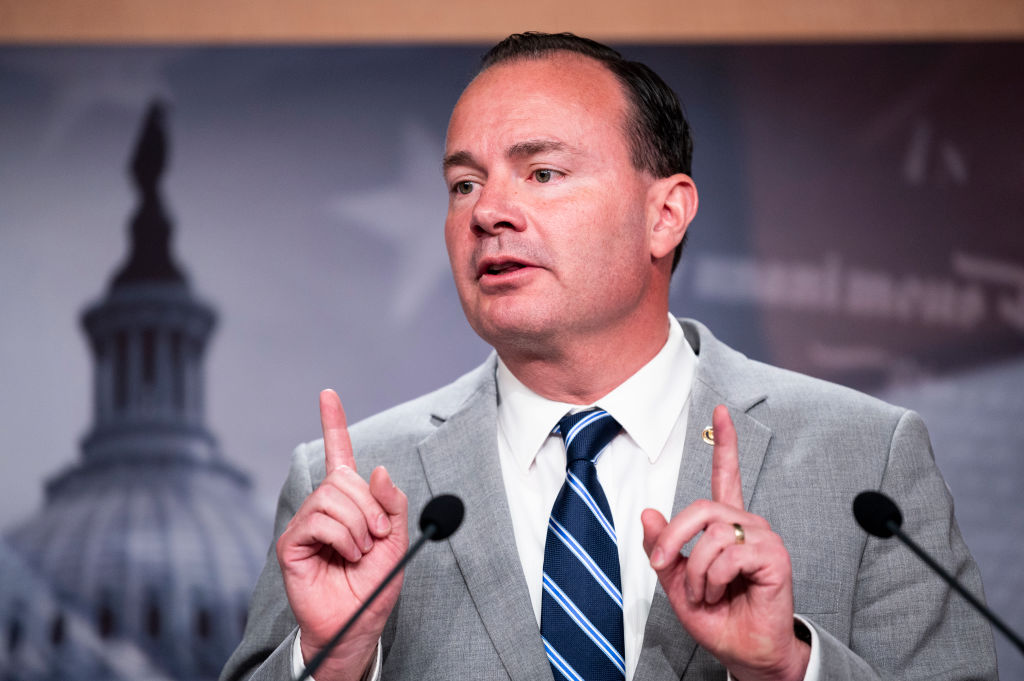
Senator Lee says the new definition is "for the internet age so this content can be taken down and its peddlers prosecuted."
When everything is on fire—or at least distracting you by insisting it’s on fire—it’s hard to focus on any single blaze, but Republican Senator Mike Lee of Utah has added to the list of worries for US citizens using the internet. Lee wants to criminalize online pornography, and while that’s alarming enough as is, his criteria casts an awfully wide net.
As reported by 404 Media, this is Lee’s third attempt to pass the Interstate Obscenity Definition Act (IODA) bill since 2022. In a press release from Lee’s office, the senator takes aim at pornography and its transmission across state lines, effectively banning online porn. Lee says his goal is to “clarify the legal definition of ‘obscenity’ for all states,” and insists the point of the bill is to protect kids.
In this case, ‘protect the kids’ is the totally unserious dogwhistle blaming the fall of society on everything from videogames to porn.
Lee’s latest attempt seeks to reevaluate standards established in a 1973 Supreme Court ruling by removing “intent” and broadening the criteria for what counts as obscenity. That’s nightmarish for a million reasons, but to name a few immediate red flags:
- It’s no one’s business adults are watching or making porn
- This is never just about porn, it’s an easy way to target LGBTQ+ representation more broadly
- The language paves an easy path to banning adult games and other media
- It’s also an easy way to ban forums or social media hosting that content
- Most platforms with a hint of violence, sex, or vulgarity require users input their age
- The US has a long history of bogus obscenity claims, as outlined by the ACLU
Today, American law uses the Miller test guidelines to evaluate if the average person would agree that the subject in question appeals to “prurient interest.” It also considers if the work “portrays, in a patently offensive way, sexual conduct,” and if it lacks “serious literary, artistic, political, or scientific value.”
That’s already a lot to argue about, but the IODA language adds “depicts, describes, or represents actual or simulated sexual acts with the objective intent to arouse, titillate, or gratify the sexual desires of a person”.
The possible arbiters of what’s arousing, titillating, or gratifying wildly concern me, and I can’t help but think about the corners of the internet this extends to, like games, and how we’ve seen it handled in the past. When banks in Japan cut off Steam payments for sex games, devs were left without income. Twitch can’t seem to articulate its nudity policies around how much or what part of the boob is inappropriate. Then there’s disappointing self-censorship, like years ago when BioWare toned down gay romance in Mass Effect after Fox News fearmongering.
When it’s all to protect the ever enigmatic “kids,” everyone gets on board, but the senator and his colleagues don’t seem too concerned by the Trump administration’s cruel DOGE cuts or their eagerness to blame gun violence on videogames. Those battles often invoke the same “protect the kids” war cry, but dig a little deeper, and it’s just a book-burning tirade with a different cover.
Bills are introduced all the time. Most die long before they have a chance for the sitting president to sign them into law or veto, but America’s polarized congress is unpredictable and states like Florida and Texas have already instituted laws demanding you share your government-issued ID to access porn sites. Going back to the fire thing, I’m reminded of NPR‘s report on Trump’s ‘flood the zone’ strategy—overwhelm the media with too much so it’s impossible to focus on everything. Some plans fail, but others slip by. Maybe Lee fails a fourth time, but it sure is hard to distinguish which threats are imminent when it’s all so volatile.



